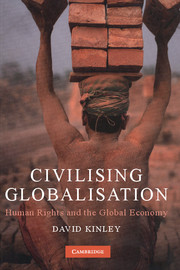1 - Economic globalisation and universal human rights
Published online by Cambridge University Press: 05 June 2012
Summary
Overview of the relationship
The phenomena of human rights and the global economy are two of the most prominent and influential features of international relations. Like star actors sharing the same scene, they jostle for attention, try to pull rank and sometimes undermine each other, all the while knowing – if they are wise – that their best prospects for individual success lie with ensuring that the other succeeds too. Certainly, human rights and the global economy might appear at first, and even later, to be a rather odd couple, destined to disagree and diverge, with one concerned with human well-being, the other with economic well-being. But the two intersect often and increasingly so in terms of their goals, their operations and their institutions. This book focuses on these points of intersection from the particular perspective of advancing the aims of human rights, by asking: in what ways does, can and should the global economy support and assist human rights, and in what ways do, can and should human rights instruct the global economy? The ambiguity in the use of ‘civilising’ in the book's title is meant to convey both of these perspectives – that is, the civilising influence of globalisation itself (it can provide the means for individuals to live better lives), and the civilising influence of human rights that can temper the inequities (or ‘market failures’ as they are euphemistically called) that unbridled globalisation would otherwise produce.
- Type
- Chapter
- Information
- Civilising GlobalisationHuman Rights and the Global Economy, pp. 1 - 36Publisher: Cambridge University PressPrint publication year: 2009



